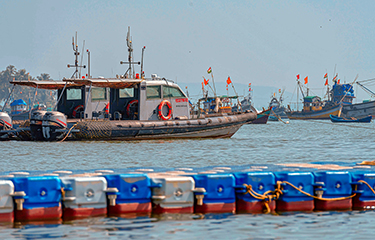Climate scientists suspect that impacts of climate change have led to lower marine catches along the west coast of India, environmental news service Mongabay reported.
Last month, India’s Central Marine Fisheries Research Institute (CMFRI) released its Marine Fish Landings Report 2019, which provided data about marine catch in each Indian state.
Maharashtra, a state in the west coast, saw its 2019 fish catch fall to its lowest level in 45 years, with the output of all marine species diving significantly, Mongabay said.
The estimated fish catch in the state last year declined 32 percent year-on-year to 201,000 metric tons (MT), from 295,000 MT in 2018.
The main reasons for the lower catch might come from adverse weather conditions – such as heavy rains – and overfishing of juveniles, K.V. Akhilesh, a scientist working at CMFRI Mumbai, said. Akhilesh added that extreme weather events, possibly because of climate change, are expected to rise in the years ahead.
In 2019 India encountered roughly six severe cyclones, which hit fishing activities hard, especially in the west coast.
“Last year, the western coast witnessed many cyclones due to which the fishing days were less, and the cyclones are increasing from the last three years,” Ganesh Nakhawa, a member of the Karanja Fishing Cooperative Society in Raigad, said. He added that distressed fishers in the region had their annual catch shrink by a half.
Other experts believed that global warming has caused the phytoplankton population to decline and enhance fish migration, resulting in lower catch.
Roxy Mathew Koll, a scientists at the Indian Institute of Tropical Meteorology, Pune, told the news service the fewer fishing days on the west coast were attributed to extreme weather conditions and overfishing. He said the weather events were linked to climate change.
The warming has been recorded in the Indian Ocean and this has led to the migration of fish from warm waters to cooler regions, Koll said.
Meanwhile, the marine phytoplankton population in the Indian Ocean has contracted about 30 percent in the western Indian Ocean alone during the rapid global warming in the last 16 years, affecting food for whales, shrimp, and jellyfish, a study led by Koll showed.
An estimated 60 to 75 percent of India’s marine catch is from the west coast region. Like Maharashtra, the marine catch also dropped by between 4 to 44.4 percent year-on-year in 2019 in the remaining states including Goa, Kerala, and Gujarat. Indian mackerel and Indian oil sardine topped the decline, among others.
Last year, India’s marine catch rose 2.1 percent to 3.56 million MT. Mongabay said the growth was made thanks to the increase in the eastern coast, typically from Tamil Nadu.
Photo courtesy of leshiy985/Shutterstock







